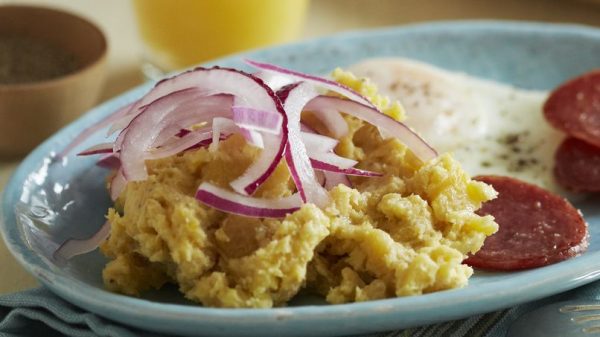
Mangú, is a traditional Dominican breakfast and dinner food. It is the Dominican equivalent of mashed potatoes. Mangú is served with fried Dominican sausage or white cheese and sunny side up eggs.
Now a campaign is underway to motivate the Real Academia Española (RAE) to include the Dominican word in the RAE Spanish language dictionary, the main source of reference for Spanish speakers. Fabio Guzmán Ariza, president of the Dominican Language Academy, understands the chances are high for this to happen, yet urges channeling the request through that institution to ensure it becomes a reality sooner than later. People can write to secretaria@academia.org.do
Guzmán Ariza explains the word is already in the “Diccionario del español dominicano,” the dictionary that gathers Dominicanisms. He said it is described as mashed boiled green plantains with oil or butter. He says the term is also already in the “Diccionario de americanismos” of the Association of Spanish Language Academies (Asale).
He tells that the dish is already well known abroad because of the many promotional events. He mentions that Dominican mangú made it into the Guinness Book of Records when on 27 February 2018, “Despierta América,” the Univisión TV show prepared a mangú of 292.57 kilograms to celebrate the Dominican independence day. Likewise, Dominicans were said to have won the 2017 Baseball Classic thanks to “mangú (platano) power.”
He says the plural is mangús, and not manguses. He also says the diminutive is written as mangucito and not mangusito.
Fabio Guzmán explains that the including mangú in the “Diccionario de la lengua española,” is not exclusive decision of the Spanish Language Academy (RAE). He said the decision will be a collaboration of the 23 language academies that make up the Spanish Language Academies (ASALE), including the Dominican Academy of Language. He says the Dominican Academy of Language is the entity that needs to channel the request to the RAE.
Read more in Spanish:
Dominican Language Academy
9 February 2021

